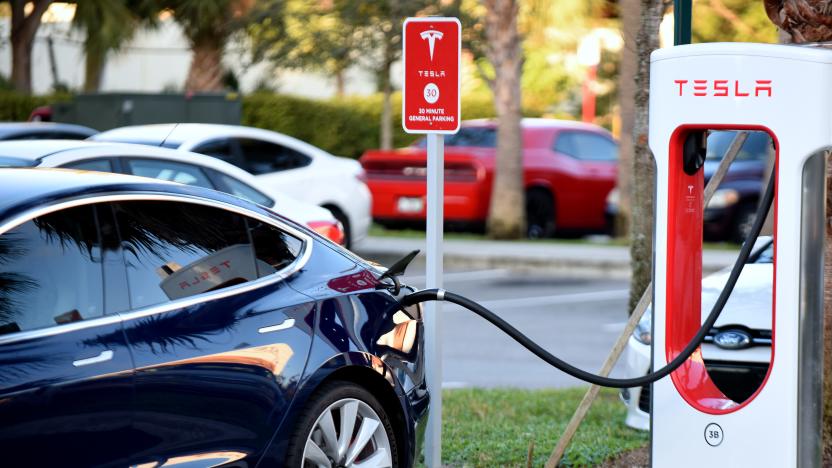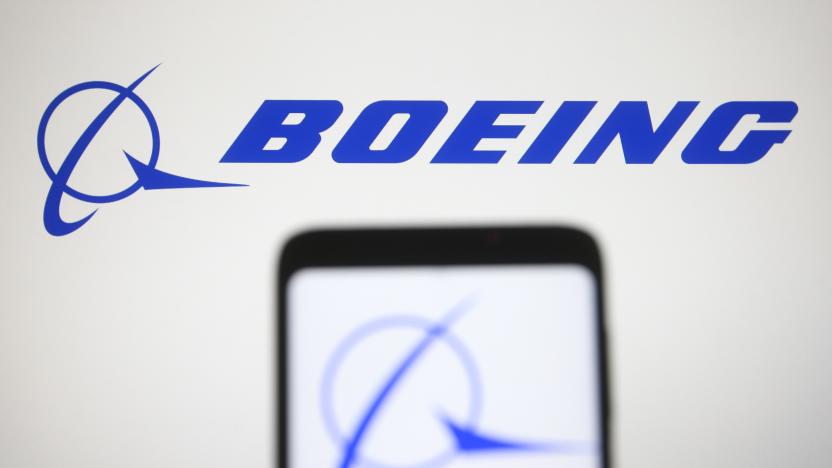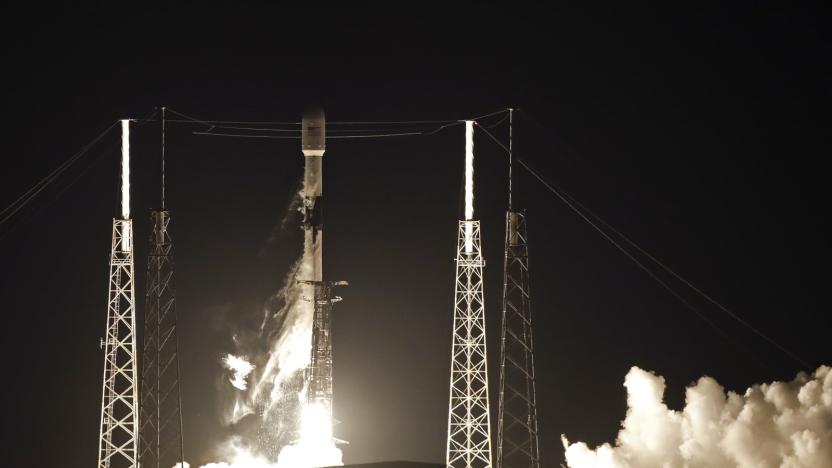satellite broadband
Latest

Amazon builds new Florida satellite facility for its Starlink rival
Amazon’s Starlink rival, Project Kuiper, is moving closer to liftoff. The company announced today that a new $120 million satellite-processing facility for the project is under construction at Kennedy Space Center in Florida. Amazon plans to launch its first satellites “in the coming months,” followed by the first customer pilots next year.

Tesla is deploying Starlink satellite internet dishes at Superchargers
Tesla is rolling out Starlink satellite internet dishes at Supercharger stations, and might just save you from using cellular data to stream shows.

Boeing gets FCC approval for a satellite broadband network
Boeing has received FCC approval for a satellite broadband network that could complete with rivals like Amazon and SpaceX.

Amazon's custom Ka-band antenna will deliver less expensive satellite internet
Amazon unveiled on Wednesday a revolutionary Ka-band phased array antenna design that will allow for more compact and less expensive user terminals.

SpaceX hopes to offer satellite internet to customers by mid-2020
SpaceX has Starlink internet satellites in orbit, but when is it going to offer honest-to-goodness service? You may have to wait a little while. Company President Gwynne Shotwell told a media roundtable that SpaceX hoped to offer Starlink broadband to US customers in mid-2020. Service will depend on putting enough satellites into use, and that will require six to eight missions including the one from May. Just don't ask about prices and plans at this stage -- the only clue is that this will be "additive" to SpaceX's main business instead of a primary money maker.

Elon Musk shows SpaceX's first internet satellites ready for launch
This might be your best chance to get a peek at SpaceX's Starlink internet satellites before they're hurtled into orbit. Elon Musk has posted a photo (below) of the first 60 production satellites packed into the fairing of a Falcon 9 rocket ahead of their launch this coming week. As you can tell, the housing is stuffed to the gills -- Musk added that the satellites are "flat-packed," without the dispenser you might expect for some missions.

Hughes updates its HughesNet satellite broadband with Gen4 service
On the same day that Dish's new satellite broadband service kicks off, partner Hughes is upgrading its own offering with even faster speeds. HughesNet Gen4 offers downloads of up to 15 Mbps to the 19 million (or so) Americans who can't get high-speed fixed-line broadband services. $50 a month will get customers 10 Mbps download and 1 Mbps upload with a 20GB data cap, while $80 a month offers a 30GB limit and 2 Mbps upload -- but for high-rolling hermits, $100 a month gets you the full 15 Mbps down, 2 Mbps up and a 40GB allowance. Current users wanting in on the action aren't excluded from the program, and can register their interest at our More Coverage link.

Dish Network launches nationwide satellite broadband service with ViaSat, Hughes, calls it dishNET
Dish Network's long-gestating tie-up with ViaSat and Hughes has finally arrived under the name dishNET. Sounding like an implement you'd use to clean dirty dinner plates, the nationwide satellite broadband service launches from October 1st, targeting customers in rural areas that are underserved with fixed line gear. $40 a month gets you 5 Mbps down / 1Mbps up with a 10GB data cap, while subscribers can get a $10 discount if they pick up a TV package at the same time. We asked the company if this was related to the service based upon its spectrum purchases that was hinted at back in August, and it confirmed this is just leveraging ViaSat Exede and HughesNet.

Inmarsat brings prepaid model to satellite phone calls
If you need a satellite phone, then you need a satellite phone. There's no getting around it. Researchers, government contractors and workers in remote locations around the globe rely on their near universal (and extremely expensive) coverage to keep in touch while out in the field. That has normally meant pricey, long-term contracts that lock users into service much like our nation's cellular providers. Satellite operator Inmarsat is finally providing an alternative for those that need truly global coverage (specifically, here in the US) by offering prepaid voice plans to owners of its IsatPhone Pro, BGAN, FleetBroadband and FleetPhone devices. The new plans, while no less expensive we're sure, should prove to be quite attractive to those that need satellite service for only short periods of time -- say, just a few months. The new plans will be available starting September 1st for those who want sat-phone service without the commitment. Check out the PR after the break. [Photo courtesy of Tarquin Binary]

Intellectual Ventures launches Kymeta spinoff, promises slim satellite broadband hotspots
Intellectual Ventures is best known for its tendency to sue everyone, but it's going some distance to mend that bruised image through a newly spun out company, Kymeta. The startup hopes to improve the quality of satellite broadband through mTenna-branded, Ka-band hotspots made from metamaterials -- substances that can boost and manipulate a satellite signal while occupying virtually no space, leading to self-pointing transceivers that are just a fraction of the size of what we use today. That still amounts to equipment the size of a laptop running at a peak 5Mbps, although it's small enough that Kymeta sees hotspots reaching individual customers who want access from a boat, a car or the field. We'd just advise against tossing out the MiFi too quickly. Kymeta doesn't expect the hotspot to be ready before late 2014 at the earliest, and that leaves many questions about how much of a hit we'll take to the pocketbook.

ViaSat 12Mbps 'exede' broadband gets official date and data bundles, eyes up you rural types
Still fancy some of that 12Mbps satellite broadband ViaSat announced last week? Well, the service finally got a name: Exede. Also, that suggested January 16th date for consumer roll-out has been confirmed. If you're still undecided whether you want some of that "feels like fiber" service, then maybe the freshly revealed package details might sway you? The $50 basic bundle will get you 7.5GB monthly quota which can be increased to 15GB ($80) or 25GB ($130) if that doesn't fill your data belly. Tap the PR if you want to read more.

ViaSat residential satellite broadband internet hands-on (video)
Last Thursday, ViaSat announced pricing for its new home broadband service, which is set to deliver 12 Mbps+ download speeds (3 Mbps+ up) beginning next week for $50 per month. We just dropped by the company's demo home just a few feet from the Engadget trailer at the Las Vegas Convention Center parking lot to try it out, and were quite impressed with the speeds we saw, especially considering that data was passing through the ViaSat-1 satellite thousands of miles above the Earth. We've used other satellite internet services before, and while there's still just over a half-second of latency, bandwidth speeds were significantly faster than what we've experienced with other services in the past. HD YouTube videos loaded very quickly, after a brief delay, as did Engadget and many other media-rich news websites. We performed a speed test and registered ping speeds of about 600ms, download speeds of about 30 Mbps and upload speeds of about 2 Mbps, but results aren't as accurate as they would be with a land-based connection because of latency and the way packet data is handled. We also placed a VOIP call, and while the delay was noticeable there, it was still usable. Want to see for yourself? Jump past the break as we step through ViaSat's front door to hop online.

ViaSat details home broadband, 12 Mbps service to roll out on the 16th for $50 per month
Earlier this year, ViaSat launched its ViaSat-1, a 140 Gbps capacity satellite positioned over North America. We've already heard about plans to bring Ka-band coverage to the friendly JetBlue skies later this year, but now the new broadband provider has detailed residential availability as well, through the National Rural Telecommunications Cooperative. NRTC members will have access to 12 Mbps service packages starting at $50 per month as soon as January 16th, finally bringing high-speed broadband to areas where fiber and cable services are not available. ViaSat may not be rolling out to consumers for another couple weeks, but the provider will be on-site at CES to demo the service in "residential, commercial airline, and satellite newsgathering" scenarios beginning Tuesday, and you better believe we'll be there to test it out.

ViaSat-1 sends its first words through the stratosphere to cooing stateside relatives
The ViaSat-1 story seems to be orbiting its way toward a happy ending in time for Christmas. The world's highest capacity telecommunications satellite sent down its first words on December 2nd: sadly it didn't chime a romantic "Mommy!" but a somber collection of high-bandwidth video streams, emails and websites. It'll continue back-and-forth testing, probably sending back pictures of red firetrucks until mid-December, which is when the company will assume "full control" (handed over from Space Systems / Loral) of the orbiting router and begin prepping commercial service before the end of the year. At which point, it'll be available to cover the US, Canada and Hawaii with KA-Band broadband service with partners WildBlue, Xplornet and JetBlue domestic flights.

ViaSat-1 moves into fixed orbit, aims its broadband ray gun
To advanced aliens and Europeans, ViaSat-1 is no big deal. To Americans and Canadians, however, it's their ticket to more affordable satellite broadband coverage at speeds of up to 10Mbps, as well better in-flight connectivity. The satellite's plasma thrusters have moved it into geosynchronous orbit and its payload has been switched on, so the initial service is on track to begin by Christmas time, with further services in 2012. Want to know more about the tech involved in such extraterrestrial feats? Then look for the detailed PR after the break.

JetBlue to bring Ka-band high-speed internet to the friendly skies by 2012
Despite Boeing's early efforts to make satellite service the go-to option for in-flight internet, the rather costly connection solution never really took off. It seems, satellite connectivity is about to experience something of a resurgence -- just last month Gogo announced its plans to blanket the globe with Ka-band coverage by 2015, and now JetBlue's announcing that it will be the first to deliver an on-board Ka-band network. In an agreement with ViaSat, the airline intends to bring the service to its more than 170 aircraft, beginning installation in 2012. The new broadband option will reportedly offer higher transmission speeds and more bandwidth per passenger for less money than other in-flight internet alternatives. With Lufthansa's new FlyNet service also sporting satellite-enabled WiFi, it would seem things are looking up for the future of the once doomed broadband solution.

Hylas 1 completes testing, Europe's first broadband satellite to start serving customers next week
It hasn't exactly been all that long since Avanti Communications' Hylas 1 satellite blasted off at the end of November, but it's now almost ready to start spreading some wireless broadband across 16 countries in Europe. Avanti just announced today that the satellite's in-orbit testing phase has been a "complete success," and that it will go into service sometime next week with an initial test group of customers, before beginning a broader transition on April 4th. All told, over 60 operators have signed up to offer the satellite broadband service to customers, which promises to offer connections of up to 10Mbps to folks in even the most rural areas. It's also only just the beginning -- Avanti plans to launch Hylas 2 sometime in the second quarter of 2012, which will extend its coverage to Africa and the Middle East. [Thanks, Brett]

Hylas 1 satellite blasting off today, will rain down broadband from above
Europe's about to catapult a new satellite up into orbit today, this one with the stated goal of providing broadband internet access to people in the areas hardest to reach by terrestrial connectivity means. UK startup Avanti Communications is the official name responsible for the Hylas 1, which is a funny mix of private and public investment: it's a commercial venture, yet the British state has contributed £40 million ($63m) to its development and European Space Agency tech will be used to get that 2.6-ton antenna up beyond the planet's atmosphere. Ultimately, though, the goal's a good one -- up to 10Mbps connections will be on offer, with plans for further satellites already on the books, which should serve to expand internet accessibility in parts of Africa and Asia as well. The next Hylas tin can will be leaving terra firma in 15 months, provided there no unknown unknowns pop up during that time to get in its way.









